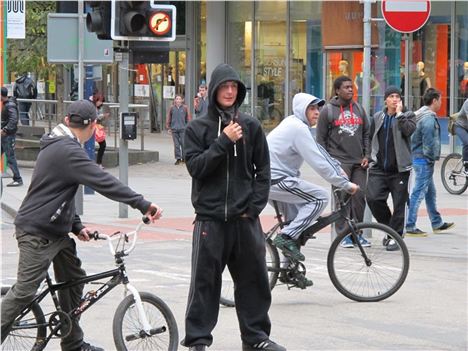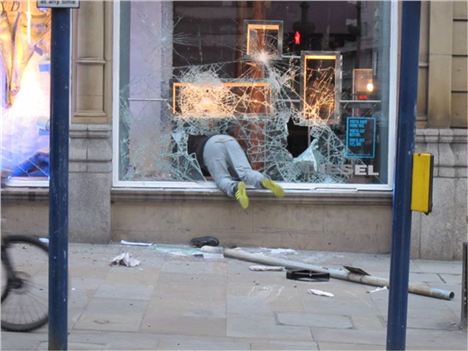IT IS just over 12 months since 15,000 of our fellow citizens took to the streets of London, Salford, Manchester and Birmingham and created havoc and mayhem. It was the most serious outbreak of public disorder and rioting for 30 years. About 2000 of the rioters have been convicted for burglary, theft, arson and public disorder.
One could summarise the Chief Constables statements as ‘this is society’s problem don’t expect the police to do very much about it.’
The courts, reflecting public opinion, have doled out much more severe sentences than normal. Up to 90% of the convicted rioters were ‘known to the police’, having on average about 10 previous convictions per person.
 Graham Stringer MPAlthough rioting daughters of millionaires got a disproportionate amount of publicity, most of the convictions were of functionally illiterate impoverished young men. We know the profile of the rioters but what have we learnt about how to stop such occurrences in the future? If the 7 reports and their recommendations on the riots, which I have just ploughed through, are anything to go by we have learnt nothing.
Graham Stringer MPAlthough rioting daughters of millionaires got a disproportionate amount of publicity, most of the convictions were of functionally illiterate impoverished young men. We know the profile of the rioters but what have we learnt about how to stop such occurrences in the future? If the 7 reports and their recommendations on the riots, which I have just ploughed through, are anything to go by we have learnt nothing.
The expensively produced report for the Cabinet Office, ‘August Riots in England’ does not even mention the Manchester riots. These reports are of mind numbing banality and the recommendations simply reflect the author’s initial prejudices. If one takes the view (as I do) that the riots were just opportunistic criminality this is perhaps not surprising.
The chronic problem of a growing criminal underclass is not open to an easy solution. In this sense the Scarman Report, produced in response to the riots 30 years ago, had an easier task in responding to institutional police racism. This report changed policing forever by introducing the 1984 Police and Criminal Evidence Act and the Independent Police Complaints Authority which procedurally made it much more difficult for the Police to behave in an unaccountable and racially prejudicial manner.
Where the reports were irrelevant and a waste of money the response of the police was worrying and revealing in equal measure. The statements of our Chief Constable Peter Fahy show him to be more of a social worker than a copper and his tactical response to this and possible future riots to be vacuous.
Let’s take just three of his statements. He has made other equally bizarre comments that could have been used to equal effect.
“No one would have backed us if we cracked down hard on rioters” he stated recently. This begs a large number of questions. How does he know? The public response to the hard line taken by the courts indicates he is wrong, as do the opinion polls. But even if he is right does this mean that he determines police tactics by balancing the view of the Guardian and the Daily Mail. His job is to protect people and property.
This statement is an abdication of that responsibility by relying on a false (and probably unknowable) assessment of public opinion. Of course in a democratic society policing has to be done with the overall consent of the public. There is not a smidgen of evidence that that consent would have been withdrawn if he had cracked down harder on the rioters.
Even weirder is his statement that “rather than concentrating on the areas where there were disturbances we should look at areas like Moss Side which did not riot...” this is like saying that when a house is burgled the police should focus on properties that had not been burgled or if somebody is murdered we should remember the 99.9% of the population that are still alive.
The third weasel statement was “...we filled our cells – not the hospitals” nobody wants disproportionate force but the fact remains that hardly anybody was arrested during the first six or so hours of the riots and looters and arsonists carried on with their criminal activity while the police stood by.
The cells were only filled later using acres and acres of CCTV footage and many person years of police officer time. It also resulted in the ‘usual suspects’ i.e. those with records being arrested hence the very high rate of people with previous convictions being sent down. The implications are that first time offenders with no police record got away with it.
One could summarise the Chief Constables statements as ‘this is society’s problem don’t expect the police to do very much about it.’ Interestingly this is in stark contrast to the Met Police who have recognised and apologised for their too slow too soft response. It is also nigh on impossible to imagine Peter Fahy’s predecessor Mike Todd making any of these statements.
There is obviously a huge range of opinion within the police force about how our communities should be policed. From the societal analysis of ‘nothing to do with me guv’ of Peter Fahy to the more interventionist ‘let’s catch and lock up the criminals’ of Todd and others. This is a job for democracy and the electorate to determine, not one top copper. Our last four Chief Constables Anderton, Wilmot, Todd and Fahy embody four different philosophies of policing.
Let’s hope when it comes to the election of a police commissioner in November that these issues are central to that debate and result in a police service that follows the democratic will of the people and not one that guesses at it.












